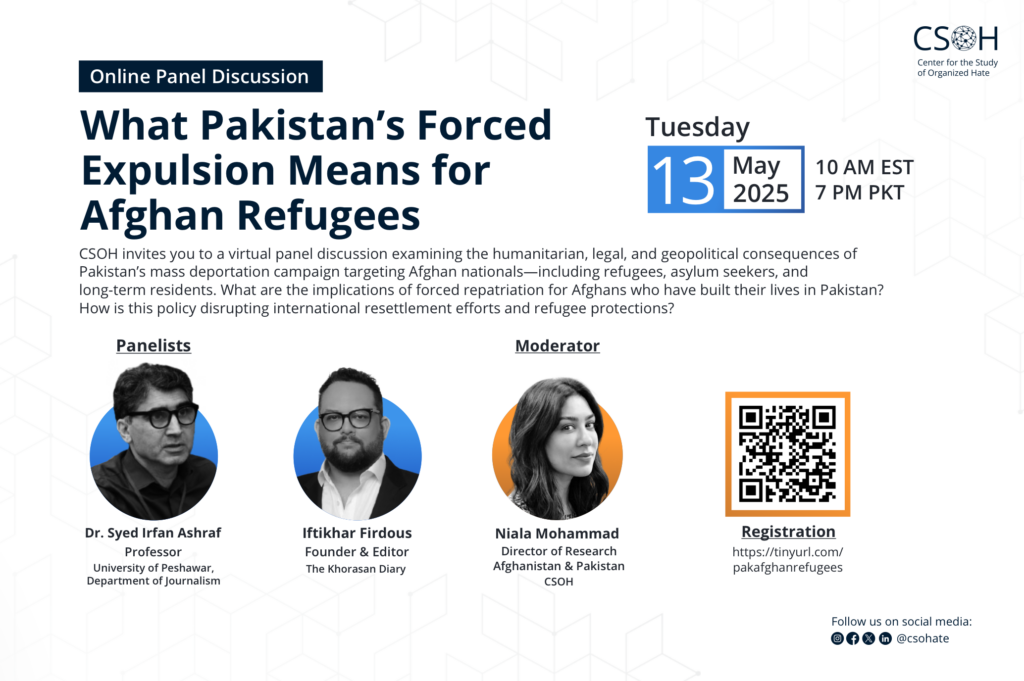Nearly 3 million Afghan nationals—including refugees, asylum seekers, and long-term residents—now face the threat of mass deportation from Pakistan following Prime Minister Shehbaz Sharif’s October announcement of a three-phase initiative under the government’s “Illegal Foreigners Repatriation Plan.” This sweeping policy aims to expel Afghans, regardless of their legal status or length of stay, and forcibly return them to Taliban-controlled Afghanistan.
The crackdown has intensified in recent months, affecting even those Afghans currently in the process of resettling in the United States, Canada, the United Kingdom, and other European countries. Many had fled Afghanistan after the Taliban takeover in 2021, while others have lived in Pakistan for decades. Some were even born there, have married into local communities, and know no other home or language.
According to the United Nations High Commissioner for Refugees (UNHCR), Afghans in Pakistan routinely face discrimination, limited access to formal education, employment, or buying property and lack of legal protections—conditions that already render their lives precarious. Pakistan has now declared that once deported, Afghans will not be permitted to return—raising serious concerns for individuals and families who have spent decades, if not generations, building their lives in the country.
The Center for the Study of Organized Hate (CSOH) invites you to a virtual panel discussion exploring the humanitarian, legal, and geopolitical implications of Pakistan’s deportation campaign. What are the implications of forced repatriation for Afghans who have built their lives in Pakistan? How is this policy disrupting international resettlement efforts and refugee protections? And what role can civil society and the global community play in safeguarding the rights of displaced populations?
Panelists
Dr. Syed Irfan Ashraf
Syed Irfan Ashraf holds a PhD in Mass Communication and is currently an Assistant Professor at the University of Peshawar, Pakistan. He began his career in journalism, working for various publications, including Dawn News, where he covered the “war on terror.” He also served as a fixer for foreign news networks, including the New York Times. In 2011, he availed the prestigious SUSI exchange program in the U.S and the next year left for his Ph.D. at Southern Illinois University, Carbondale. In 2014, he received the Mirror Award for his media criticism. His work is published in many foreign and national research journals. In 2022, he published his book titled “The Dark Side of Journalism.”
Iftikhar Firdous
Iftikhar Firdous is a journalist, author and researcher from Peshawar, Khyber Pakhtunkhwa. he holds a doctoral degree in psycholinguistics. He has been editor for two major media outlets of Pakistan and specializes in the studies of terrorist ideologies and belief systems. He is founder and editor of The Khorasan Diary, a digital platform that focuses on conflict, migration and political economy.
Moderator
Niala Mohammad
Niala Mohammad serves as the Director of Research, Afghanistan and Pakistan at the Center for the Study of Organized Hate (CSOH). Previously, she held the role of Director of Policy and Strategy at the Muslim Public Affairs Council (MPAC) and served as a Senior Policy Analyst for South Asia at the U.S. Commission on International Religious Freedom (USCIRF). Before this role, she served 14-plus years as a multimedia broadcast journalist with the Voice of America covering South Asia.
You can register for the event here.
